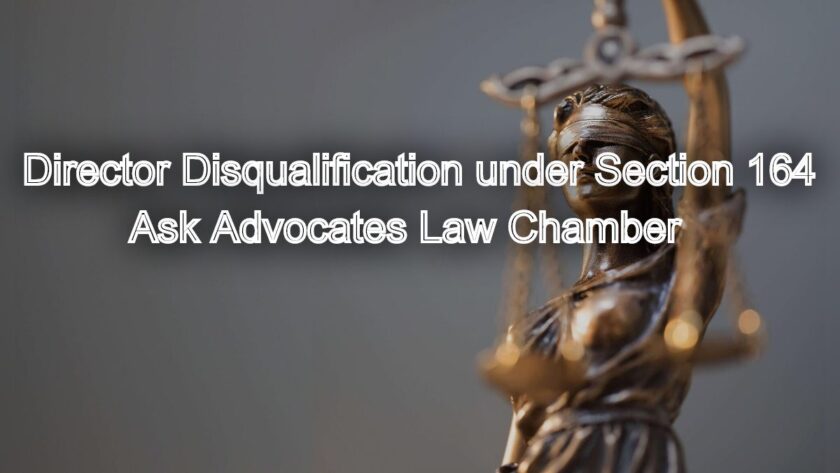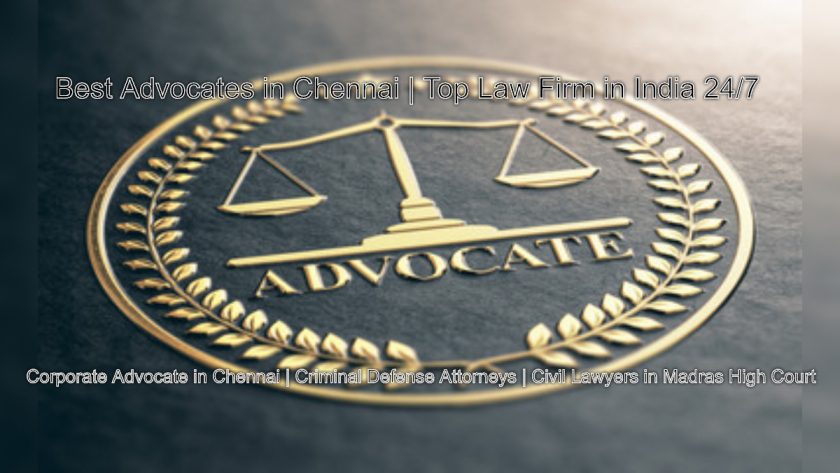Corporate governance is paramount for a healthy business ecosystem. Directors hold significant fiduciary duties. They must ensure company compliance with statutory provisions. However, sometimes directors fail in their obligations. This can lead to severe repercussions. One such consequence is director disqualification. Section 164 of the Companies Act, 2013, governs this critical aspect. It outlines specific grounds for disqualification. Facing such a disqualification notice can be devastating. It impacts one’s professional reputation. It also restricts future business endeavors. Therefore, understanding the nuances of this provision is crucial. Knowing the available remedies before the National Company Law Tribunal (NCLT) is equally vital. Ask Advocates Law Chamber provides robust legal defense. We navigate these complex challenges with expertise.
Director Disqualification under Section 164 of Companies Act: NCLT Remedies: Ask Advocates Law Chamber
Understanding Director Disqualification under Section 164
Section 164 of the Companies Act, 2013, lays down the conditions for director disqualification. This provision aims to promote corporate discipline. It prevents individuals from holding directorships if they fail to meet certain compliance standards. Consequently, it safeguards stakeholder interests. The Act specifies various grounds for disqualification.
Firstly, Section 164(1) outlines grounds related to an individual’s personal conduct. For instance, a person stands disqualified if they are of unsound mind. Similarly, undischarged insolvents face disqualification. Conviction by a court for an offense punishable with imprisonment for six months or more also leads to disqualification. Furthermore, if a court order disqualifies a director from holding office, that order is effective. Failure to pay calls on shares held for more than six months likewise triggers disqualification. Conviction for a related party transaction offense also falls under this sub-section. These grounds focus on an individual’s personal legal standing and financial integrity.
Secondly, and more commonly, Section 164(2) deals with disqualification due to company non-compliance. This provision is a powerful tool for regulatory enforcement. A director of a company faces disqualification if that company:
- Has not filed financial statements or annual returns for any continuous period of three financial years.
- Has failed to repay deposits, or interest thereon, or redeem any debentures, or pay interest due thereon, or pay any dividend declared, and such failure continues for one year or more.
This particular sub-section casts a wide net. It directly links a director’s eligibility to the company’s compliance record. Consequently, many directors face disqualification due to reasons often beyond their direct control, especially in smaller companies with compliance lapses. Once disqualified, an individual cannot be reappointed as a director in that company. Moreover, they cannot be appointed in any other company for a period of five years from the date of disqualification. This widespread impact necessitates immediate legal intervention.
The Role of the Registrar of Companies (ROC)
The Registrar of Companies (ROC) plays a pivotal role in enforcing Section 164. The ROC maintains records of all companies and their directors. They monitor compliance with the Companies Act. Consequently, when a company fails to file its annual returns or financial statements for the stipulated period, the ROC identifies these defaults. They then generate a list of defaulting directors.
Subsequently, the ROC updates the DIN (Director Identification Number) status of these directors. The DIN status changes from ‘Active’ to ‘Disqualified’. This action effectively bars them from holding any directorships. Furthermore, the Ministry of Corporate Affairs (MCA) publishes these lists. This transparency aids public scrutiny. It also alerts stakeholders. Receiving an intimation from the ROC about disqualification can be sudden. Many directors become aware only when they attempt to file returns for another company. Therefore, proactive compliance monitoring is critical. A legal team can assist in checking DIN status regularly. They can also represent directors before the ROC.
Grounds for Challenging Disqualification
Challenging a disqualification order under Section 164 requires a strategic legal approach. Several grounds exist for successful appeals before the NCLT. Primarily, procedural irregularities often form a strong basis. The ROC must follow due process. They must issue proper notices. They must provide an opportunity to be heard. Any failure in this regard can render the disqualification void.
Furthermore, directors can argue that the default was not attributable to them. For example, if they resigned before the default period commenced. Similarly, if they were merely nominee directors with no operational control. However, proving this requires robust evidence. Another common ground involves technical defaults. Sometimes, a company may have genuinely tried to file returns. Technical glitches on the MCA portal might have prevented successful submission. Providing evidence of such attempts can be crucial. Moreover, directors can argue that they were unaware of the default. However, this argument typically carries less weight due to the principle of “ignorance of law is no excuse.” Despite this, exceptional circumstances might warrant consideration.
NCLT Remedies for Disqualified Directors
The National Company Law Tribunal (NCLT) is the primary forum for seeking remedies against director disqualification. The NCLT exercises wide powers. It can set aside a disqualification order. It can also grant interim relief. Many aggrieved directors file a Writ Petition before the High Court. However, post NCLT’s establishment, the NCLT is the most appropriate forum for seeking relief under the Companies Act.
Directors typically file an application or petition under Section 241 or 242 of the Companies Act (for oppression and mismanagement, if applicable, which can sometimes be linked to the reasons for default). More directly, they can file a petition for condonation of delay in filing statutory returns. Alternatively, they can seek restoration of DIN. The NCLT can order the ROC to reactivate the DIN. It can also direct the company to file its overdue returns.
Furthermore, the NCLT can grant an interim stay on the disqualification. This allows the director to continue holding other directorships while the main petition is heard. Obtaining an interim stay is crucial for continuity of business operations. The NCLT evaluates various factors. They consider the bona fides of the director. Also assess the reasons for default. They weigh the potential prejudice caused by disqualification. A well-drafted petition with strong documentary evidence is essential for securing a favorable order.
The Litigation Process at NCLT
Filing a petition at the NCLT involves specific procedural steps. First, the aggrieved director (or directors) prepares a detailed petition. This document outlines the facts. It explains the grounds for challenging disqualification. It includes supporting affidavits and annexures. These comprise financial statements, ROC filings, and correspondence. Next, the petition is filed with the relevant NCLT bench. Chennai has an NCLT bench.
Upon filing, the NCLT issues notice to the ROC and other relevant parties. The ROC then files its reply or objections. Subsequently, the petitioner files a rejoinder. The NCLT then schedules hearings. Both sides present their arguments. They rely on their written submissions and supporting documents. The NCLT bench may also seek additional clarifications. They may direct parties to submit further evidence. Finally, the NCLT delivers its order. This order can either uphold the disqualification or set it aside. A favorable order results in DIN activation. It allows the director to resume their directorships.
Importance of Proactive Compliance and Legal Counsel
Prevention is always better than cure. Proactive compliance is the best defense against director disqualification. Companies must ensure timely filing of financial statements and annual returns. They must promptly pay all statutory dues. Regular monitoring of the company’s compliance status is crucial. This proactive approach minimizes risks. It safeguards directors from potential disqualification.
However, if a disqualification notice arises, immediate engagement of legal counsel is paramount. Director disqualification carries severe implications. It impacts reputation. It affects future business opportunities. Ask Advocates Law Chamber possesses deep expertise in company law and NCLT proceedings. Our seasoned lawyers meticulously analyze each case. We devise robust defense strategies. Provide comprehensive legal representation. We protect your professional standing and business interests. Our proactive and aggressive approach aims for swift resolution. We minimize the impact of disqualification.
Frequently Asked Questions
A: Directors can be disqualified for two main reasons. Firstly, personal grounds include being of unsound mind, being an undischarged insolvent, or conviction for certain offenses. Secondly, and more commonly, a director is disqualified if the company they serve fails to file annual financial statements or returns for three continuous financial years, or defaults on repaying deposits, debentures, or declared dividends for one year or more.
A: Once disqualified, an individual cannot be reappointed as a director in the defaulting company. Crucially, they also cannot be appointed as a director in any other company for a period of five years from the date of disqualification. This severely impacts their professional career and ability to hold corporate office.
A: The Registrar of Companies (ROC) enforces director disqualification by identifying defaulting companies and updating the DIN (Director Identification Number) status of their directors to ‘Disqualified’. You might find out when attempting to file returns for another company or by regularly checking your DIN status on the Ministry of Corporate Affairs (MCA) portal.
A: Yes, a director can challenge a disqualification order. The primary forum for seeking remedies is the National Company Law Tribunal (NCLT). Directors typically file an application or petition before the NCLT, seeking condonation of delay in filing returns, restoration of their DIN, or an interim stay on the disqualification.
A: Common grounds for challenging disqualification include proving procedural irregularities by the ROC (e.g., lack of proper notice), arguing that the default was not attributable to the specific director (e.g., they resigned before the default period), or providing evidence of technical glitches on the MCA portal that prevented timely filings. A robust legal defense relies on strong documentary evidence.
Conclusion
Director disqualification under Section 164 of the Companies Act is a serious regulatory action. It carries significant consequences for individuals. It underscores the importance of corporate compliance. While the ROC actively enforces these provisions, aggrieved directors have remedies. The National Company Law Tribunal offers a vital forum for challenging such disqualifications.
Understanding the grounds for disqualification is the first step. Knowing your rights is the second. Engaging expert legal representation is the most critical third step. Ask Advocates Law Chamber stands as your trusted partner. We offer unparalleled legal defense against director disqualification. Our team leverages extensive experience. We apply profound legal knowledge. Guide you through every stage of the NCLT process. We strive to secure the most favorable outcome. Protect your reputation. We safeguard your future. We are indeed the best global force in legal defense.
Read More
- Customs Tariff Rate Conflicts with Authorities? Legal Steps You Can Take Now
- Avoid Penalties: Legal Solutions for Customs Tariff Disputes in India
- Top 10 Legal Pitfalls in Commercial Transactions and How to Avoid Them
- How to File a Company Petition Before the NCLT – Chennai Bench Explained
- Understanding Non-STPI Registration Compliance: Legal Requirements and Support
- Ministry of Corporate Affairs (MCA)



